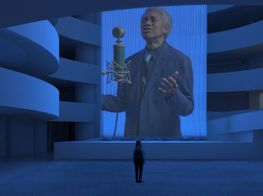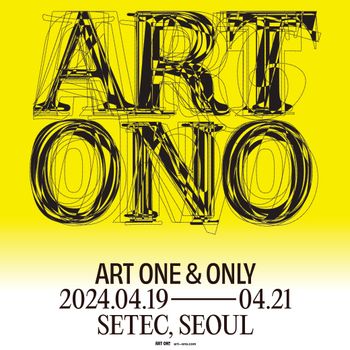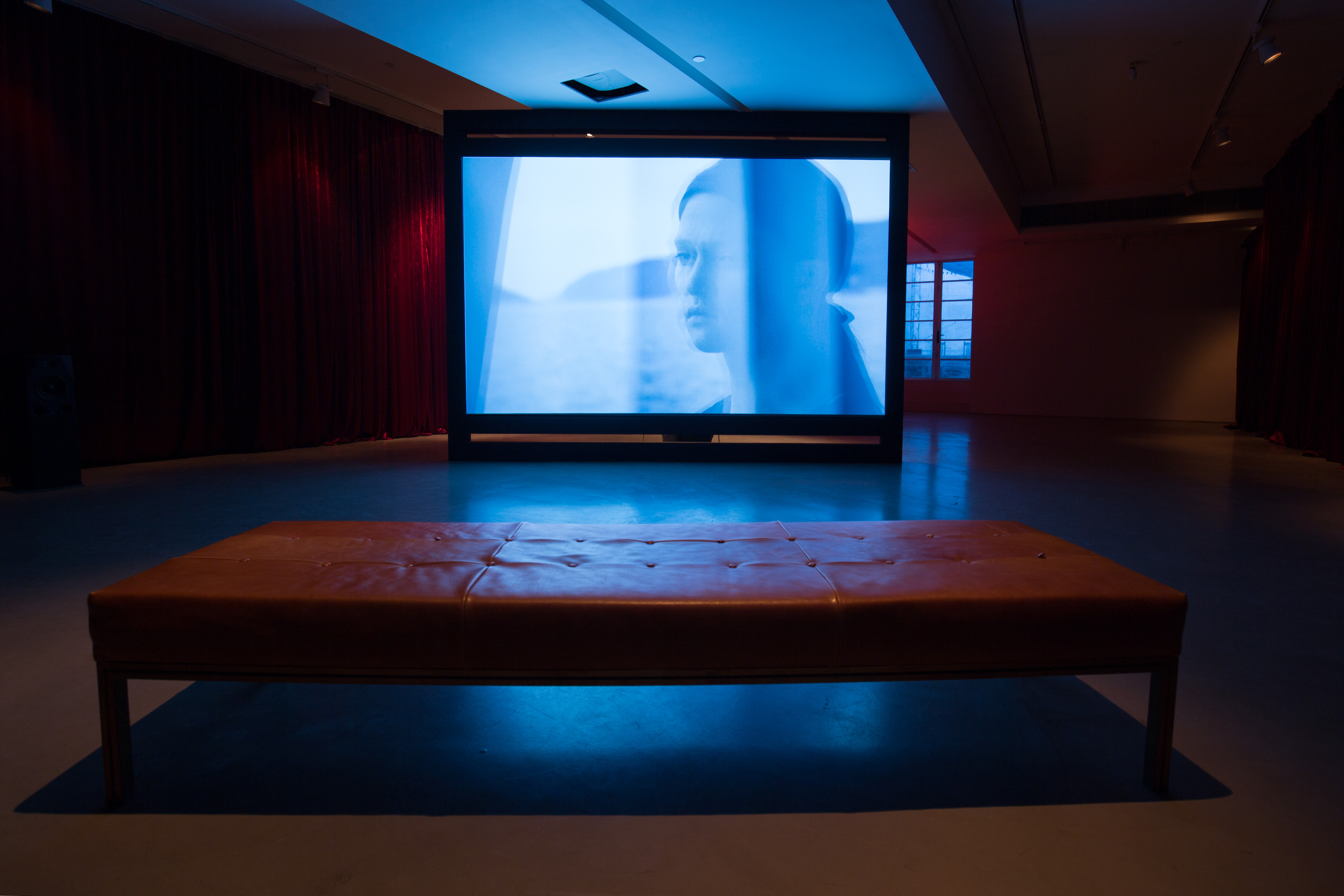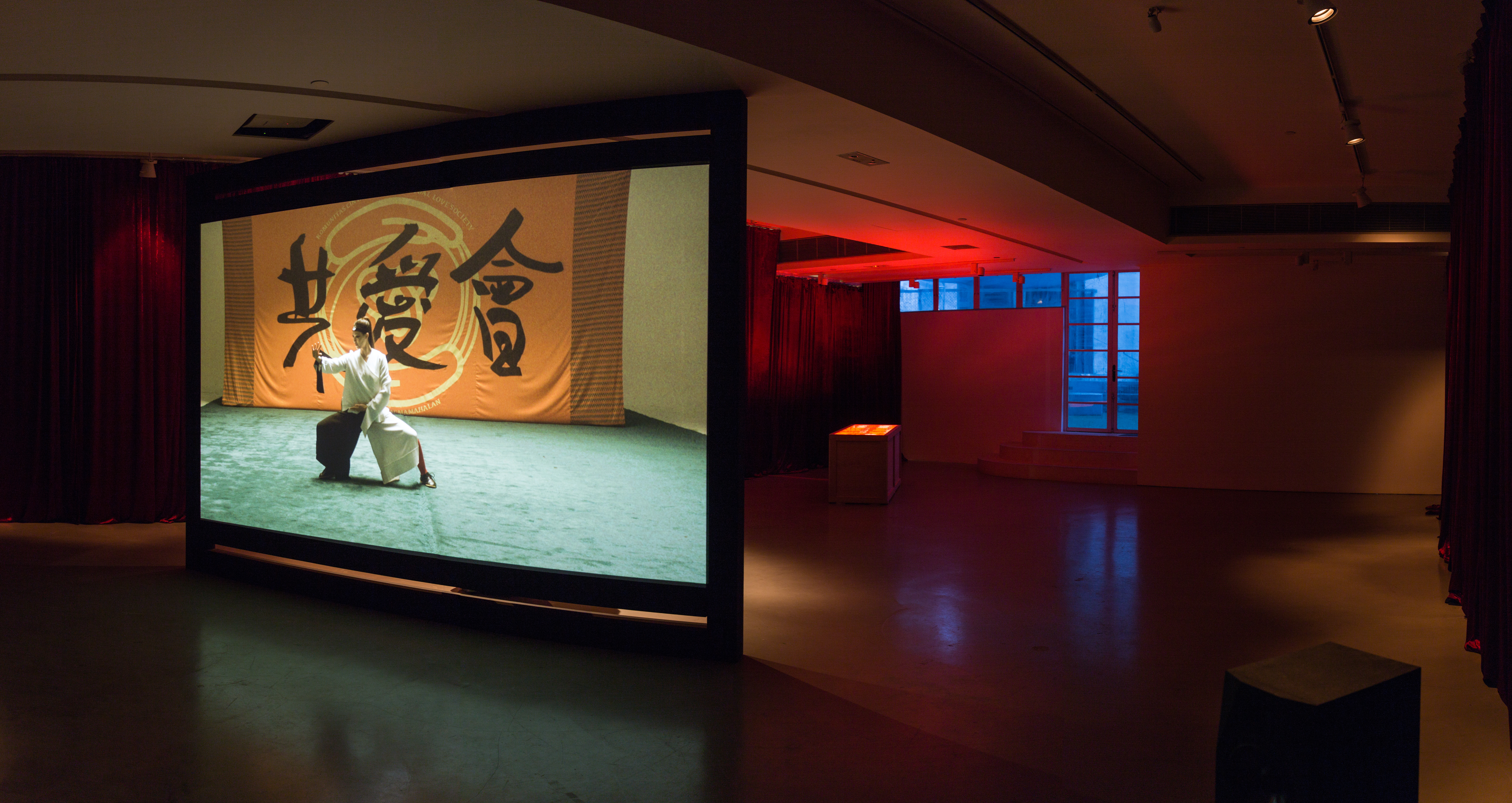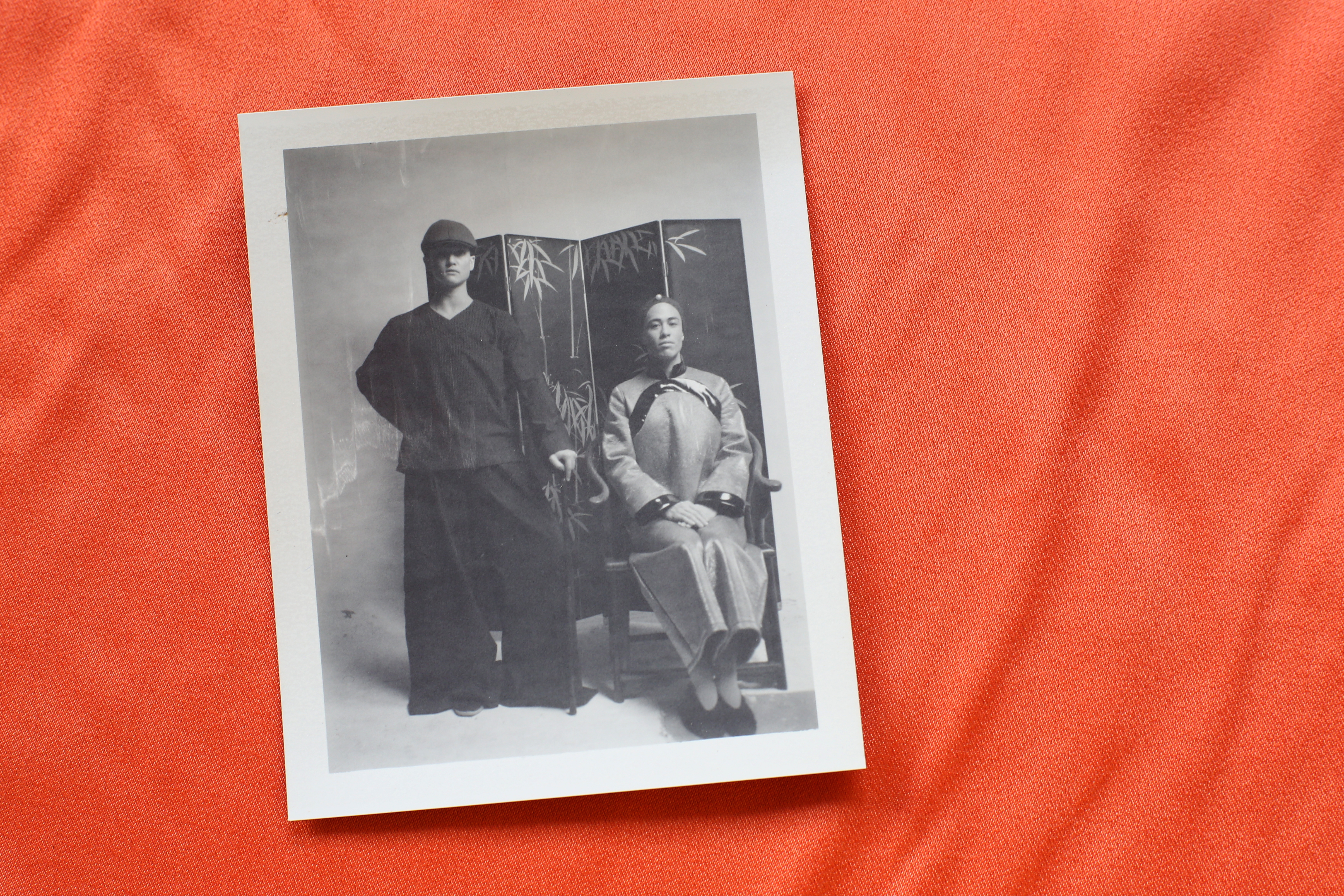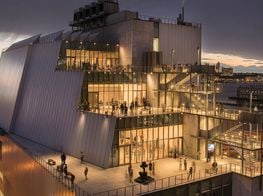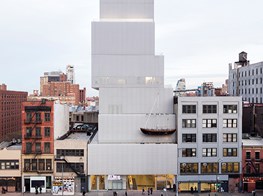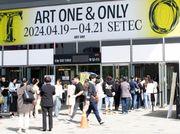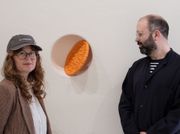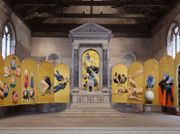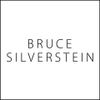Wu Tsang
Image: Wu Tsang. Photo: Tosh Basco.
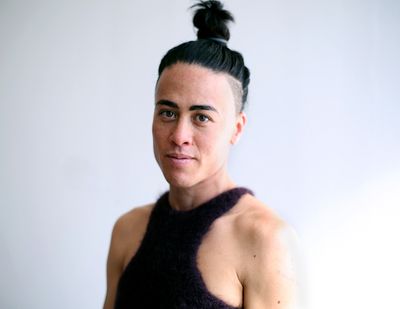
Image: Wu Tsang. Photo: Tosh Basco.
One of the wonderful things about meeting many artists and writing their stories, is that you get to lose yourself in their world, and the world of images that they create.
This happened to me on the grey sleepy Friday afternoon I went to meet visual artist and filmmaker, Wu Tsang, at Spring Workshop in Hong Kong, where she was previewing her new multi-media installation, Duilian. Following two three-month residencies at Spring Workshop, where Tsang researched the life and writing of Chinese revolutionary feminist poet Qiu Jin (秋瑾 1875–1907) and her rumoured female lover, calligrapher Wu Zhiying, the artist produced a 30-minute film and several installation works centring on the life and love of Qiu Jin. Although Qiu Jin is a well-known and revered historic figure in China, little is known about her in the West. Even less is known about Wu Zhiying (played by Tsang in the film).
A legendary feminist, and revolutionary, Qiu Jin was executed for her involvement in a failed uprising against the Qing Dynasty, which eventually led to the end of imperial rule and the founding of the Republic of China. Today, Qiu Jin is a symbol of women's independence in China, and a national heroine. Her portrait hangs in the Museum of the First National Congress of the Chinese Communist Party, a lonely heroine in a hall full of men.
I was unexpectedly seduced by the world of poetry and rich visuals Tsang has created on screen. Sitting in the darkened room in Spring Workshop, I was transported across water and across time, carried away in scenes slipping between Qing Dynasty China to contemporary Hong Kong, immersed in these women's world of love, loss and sacrifice. The film takes the theme of queer history—or rather its invisibility—as a point of departure.
It is a fictitious exploration of a women's love affair, something omitted altogether from the official annals of history. But more than this, perhaps the most important theme in the film is language, and the power it has in shaping our relationship to one another; how it can construct or reconstruct truths, how it shapes history. Through deliberate mistranslations—into Tagalog, Cantonese, and Malay—of Zhiyang's poems and official accounts of Qiu Jin, an alternative narrative is constructed for the women. It is a stunning interrogation of how language is constructed and used to immortalise, mythologise, or relegate to oblivion.
Tsang is a Los Angeles based multi-media artist and filmmaker, and was an organiser of LA's legendary Wildness parties, frequently attended by the city's LGBT community. LA's night life was the subject of Tsang's first feature, a documentary called WILDNESS (2012). Tsang's works have been shown at London's Tate Modern, the Whitney Museum of American Art and the New Museum (New York), the Hammer Museum and Museum of Contemporary Art (Los Angeles), and the Gwangju Biennale (South Korea).
DAWu Tsang, you first came to China in 2005 to reconnect with your ethnic roots—your father was born in Chongqing. It was there that you came across the historical figures of Qiu Jin and Wu Zhiying. Tell me about this?
WTIn the museum there was this amazing story about Qiu Jin and her relationship with Wu Zhiying. At this point a lot of it is speculation, but I've done a lot of research. I think what is most inspiring to me, which I didn't expect ten years ago, is this iconic figure. The writing has been healing for me, working with the poetry. It makes me think a lot about how language can escape from its time period and from the constraints of society. It can allow us to express desire or ways of being. I am trying to create a language here to communicate with others.
DAI really felt that you had a kinship with the two women, portrayed as they were with such sensitivity. But which of the two did you most relate to, Qiu Jin or Wu Zhiyang?
WTI gravitated more towards Wu Zhiyang, she's my doppelganger, I can really relate to her more, because Qiu Jin is such a monolithic figure. She's an official communist hero, and a Chinese martyr... I became interested as well in the pop cultural imagination, all the many ways that people have represented her in theatre and comic books. Wu Zhiyang is this interesting figure because she's not really known. She's this obscure figure that you only really encounter in scholarship through her writings. At the time Qiu Jin was persecuted and executed; she was not known at all. She was basically a convicted felon and a nameless person. Wu Zhiyang played the role of not only burying her but becoming her biographer and mourning her, at the risk of her own life and reputation. That idea of how we create narratives and history began with Wu Zhiyang's own involvement of preserving and sharing Qiu Jin's story. Everything we know about her is mediated through Wu Zhiyang's telling of the story.
I love the folklore. I don't care how much is true.
DAWhat journey do you want people to go on through this film? What do you want the audience to ask themselves?
WTI have this question of what is love? We have love for people, but then there's also this love for a community, or a movement or cause. What motivates that? What draws people to each other, what kind of energy? This comes from my experience as an organiser in the queer community. I always think that desire plays a huge role in making things happen—in making revolution happen. You have to be inspired and turned on to commit to something like this. That desire to connect to people in a physical way is changing a lot in the internet age.
Wu Zhiyang's character is really torn between her needs and desires.
DAYou travelled to China to do research and it's also where you came across the female Wushu group that you then used in your film. Why not just film in China, instead of Hong Kong? How does Hong Kong inform the film for you?
WTWhen I set out to do this project ten years ago, I never set out with Hong Kong in mind. But being here now has allowed me to see China from a very different perspective. People have a relationship with their Chinese identity here, yet its also completely different. It's very hybrid in a way that is very familiar to me and the way I grew up.
We filmed most of the film on a boat on Hong Kong harbour. My thinking on that was that I really wanted to create a world that was floating between different time periods: between the past and the present, but also between Hong Kong and China because I think being in Hong Kong has been a significant way for me to reflect on Chinese identity and nationalism and come at it from a critical perspective. Also, my father's family fled China in 1949 during the Communist Revolution. The first place my family went to was Hong Kong; I think Hong Kong has always been a place for people to go. This idea of a counter narrative or counter identity or stories, Hong Kong feels really appropriate to this project. And also the diversity of voices in the film, they're different people I've encountered during the making of the project who I invited to do translations with me. Everyone is coming from the queer community perspective, and all Hong Kong based.
I read the SCMP one day and they were talking about how the Communist Party [of China] is making it illegal to distort history, and I thought, 'Huh? What?' Because that's all I think history really is; it is a distortion. I was thinking about how being in Hong Kong there is this palpable anxiety about what's going to happen to the city in relation to mainland China: anxiety about censorship and freedom of speech and a way of life. There's a sense of antagonism, a sense of urgency and questioning about what's going to happen.
DAYou mentioned that the film is moving between different worlds, and that you yourself like to work between the different worlds of film and performance. In your work, there's this theme of different worlds: the afterworld alluded to with the coffin installation; the world of contemporary Hong Kong; and Qing Dynasty China. This creates identity slippages: the idea of being able to float between one world and another, of exploring different sides of one's identity. What is the importance of identity to your films and to your work as an artist in general?
WTIt's definitely a word that I love and hate. Mostly I am so invested in it, and having possibilities rather than closing down who we are. When I started this project, I had a narrative in mind; it was going to be a story about two women who wanted to be together at a time when it was forbidden. But what I discovered was that it wasn't a big deal at all. At the turn of the century in China there were all kinds of female relationships and they weren't even private. They just had different ways of defining intimacy and desire. In that sense the identity categories that we have now just don't apply, and I found that to be inspiring. Qiu Jin for me in a sense is a trans figure—of course there's the surface thing; she dressed in men's clothing, carried a sword and had this persona of a male figure, like a knight—but in a deeper sense she really created a way of being that didn't exist at the time. There was no rulebook and no role model. It was just her and her friends, travelling independently as women and doing things that you just didn't do. Love was just one layer of their struggle to define themselves and exist in a time when it wasn't easy to be a woman.
DAYou're saying the relationship wasn't a big deal at the time, yet that part of her history has been willfully neglected. By doing this film you are trying to address it and fill in the gaps in history. I feel that there are moments where you pick up the thread of your trans-activism in the film. There was a quote in it, 'Since the revolution has failed in our community its time to brandish our swords'. Is this a reference to address the history of the queer and women community?
WT[Laughter]
Yeah I agree. We're laughing though because that particular line of poetry came out of a mistranslation.
DAWhat was the original meaning?
WTIn the editing context in the social event that we had, that [quote] was something that came out of that group activity but it was also something I wanted to say. It has to do with the direction that trans-politics in the US is going right now. It's failing me. It's kind of consolidating under this mainstream sentiment of the LGBT framework of visibility and inclusion and normativity... and we now have Caitlin Jenner. I won't go there.
It's been very good for me to step out of that context. In the US right now as a trans-activist or trans-artist, I feel really pressed upon to respond to all things trans. People are always contacting me for comments. It has nothing to do with me. This set of issues are not at all related to the things I'm fighting for. It's been really refreshing to go somewhere where that's not the conversation people are having, in Hong Kong I mean.
DAThis project has been a ten-year commitment—longer than any Hollywood marriage—and it's quite a part of your life. What is it about these two women that really inspired you to do this project? Is it a desire to do justice to Qiu Jin's story, to bring into the spotlight the marginalised and neglected parts of her history?
WTI'm just telling the stories that are important to me. I don't consider her to be marginal because it's central to me. I'm interested in how that word [marginal] operates in relation to identity, it presumes that there is a centre. She's a vessel. This idea of the martyr or the hero, or even the love story, that's a vessel. Who doesn't love a love story? Or a tragic love story. It provides a structure, a kind of formula to say a lot of other complex things.
I think a lot of my things use performance to get at something real, not fantasy. The play-acting becomes a way in which we unconsciously reveal ourselves. That's why the aspect of the community involvement and the creation of the content which led to the script, is not so much about telling a story as about creating a portrait of the world around me. She's a vessel enabling me to do that.
I feel very sensitive and aware of the fact that anything to do with queer identity, people tend to gravitate and focus on that, but if there's one thing I hope people take away ... my interest and focus is really on language and how language defines what is and what's not possible: how we are bound by it, but also how we can escape through it or from it. And also, not to claim Qiu Jin as a queer person or queer hero, but really telling a story in parallel to her story. That's the only thing I really want to try to create a conversation about. —[O]

